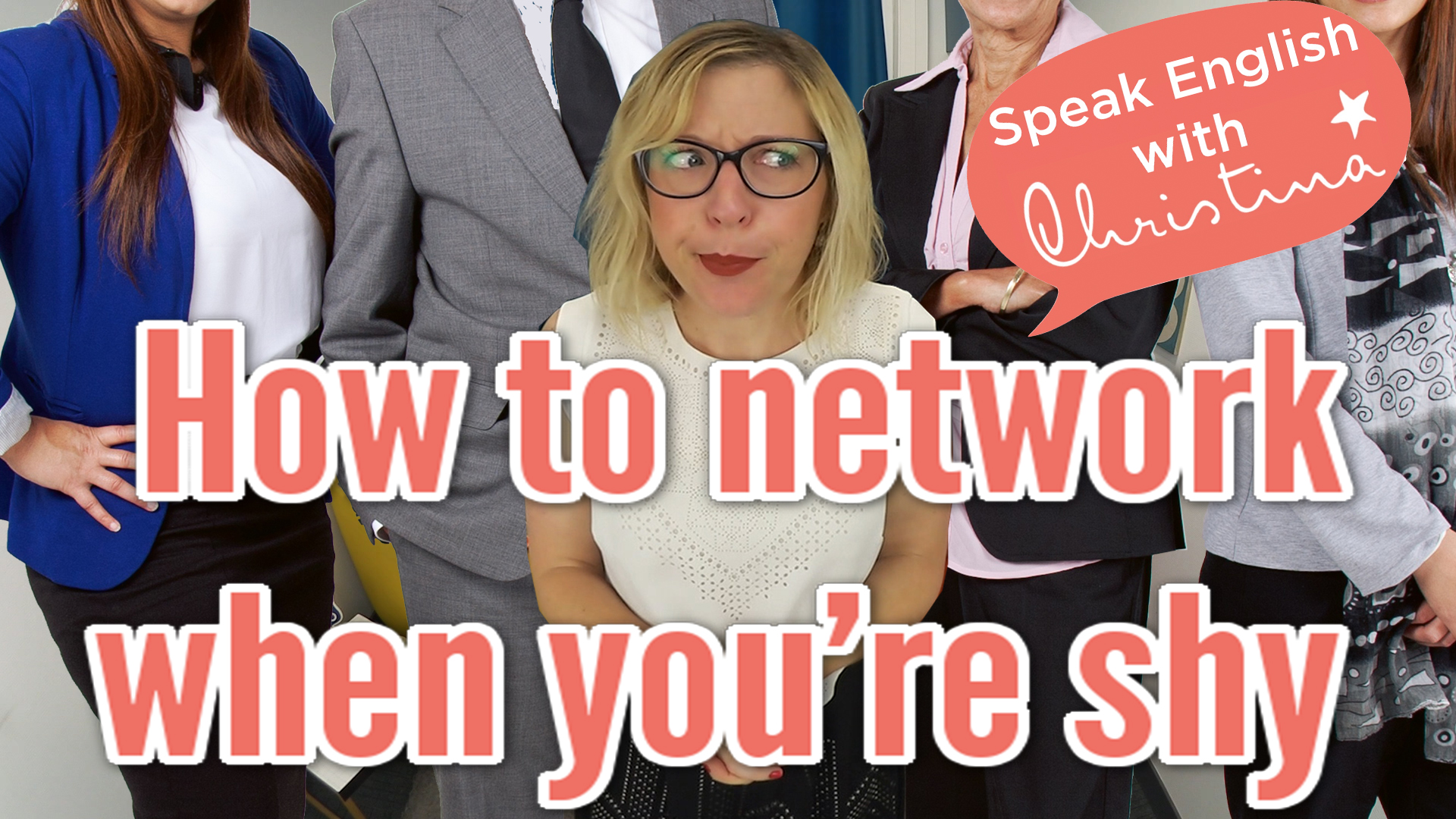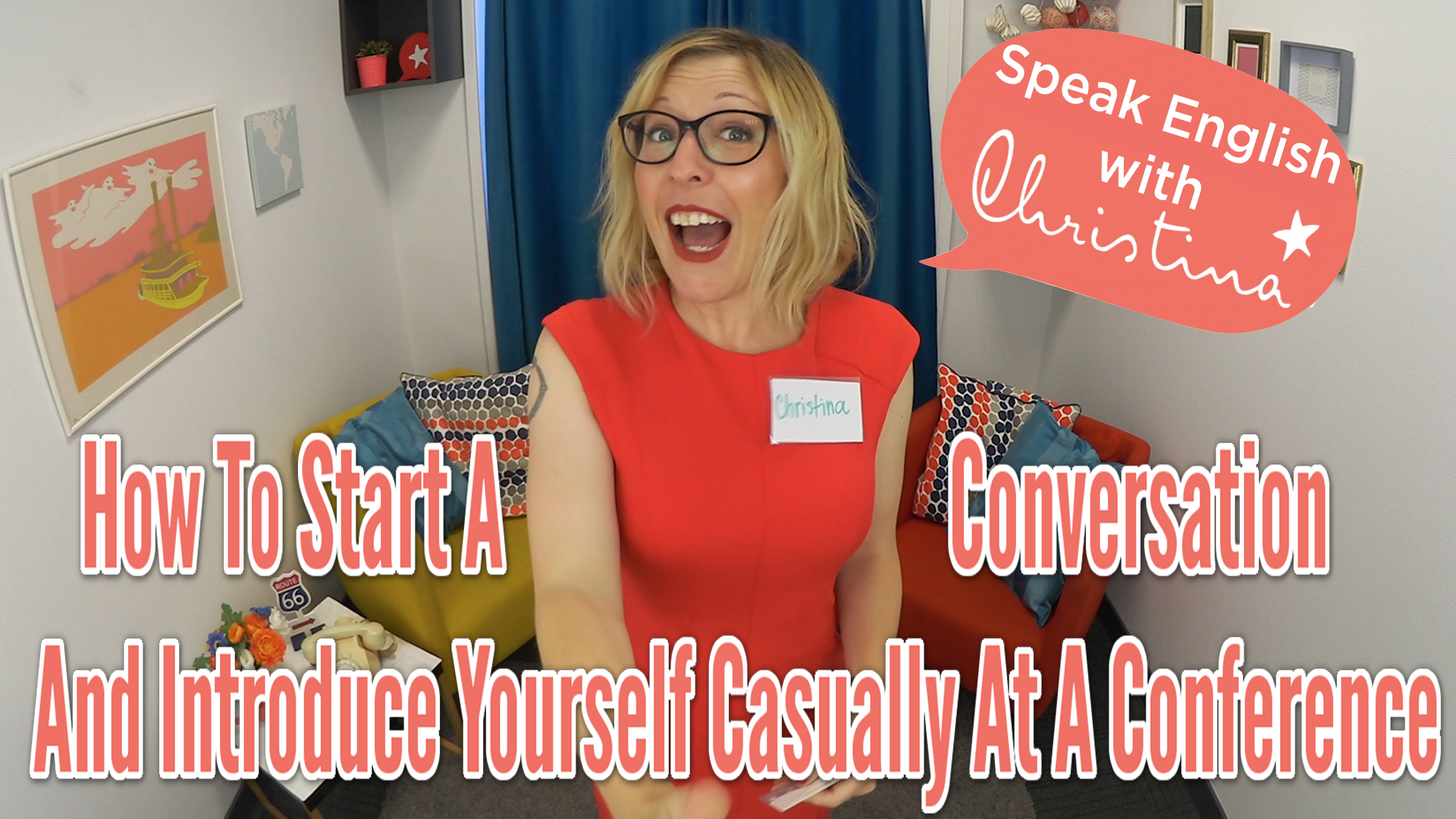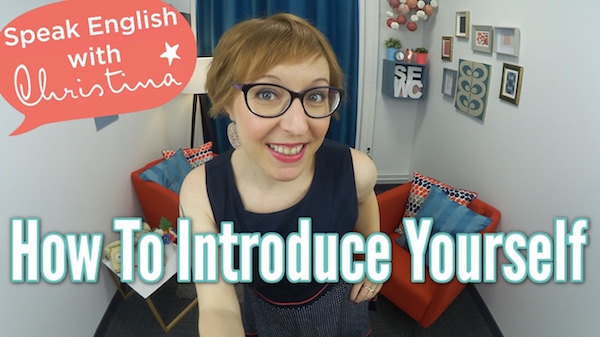
Conferences are a great opportunity to network and grow your business or excel in your industry.
However, many of my students have told me that they feel shy at conferences.
This, combined with speaking in American English rather than a language they feel more confident in, can make things extra difficult.
For some people, their shyness and language confidence may prevent them from going to conferences. Missing out on an educational and fun networking opportunity because you feel too shy is tragic to me.
That’s why I created this episode. I hope the tools and strategies I share today will help those suffering from shyness to feel more confident at conferences.
If you’re shy, and it prevents you from doing things that can help your career or business evolve, this episode is for you!
If you’re attending a conference, you need your small talk skills up to speed. That’s why I’m creating a new course–American English: Confident Conversation Skills--to help you master social situations and everyday conversations in your professional life.
It teaches you how to socialize with confidence, and build up those important personal and professional relationships, get techniques to make you a good conversationalist, as well as understand cultural differences on a deeper level.
If you’re ready to network like a pro and improve your small talk skills for your next conference, go to this page and sign up. In as little as 20 minutes per day, you’ll learn to feel confident in American English at your next conference!
Get Online
Going to a conference can be intimidating, especially if the room is full of strangers.The internet is a great tool for shy people.
A big fear for many introverts is walking up to someone they don’t know and striking up a conversation. However, meeting people online is much easier than meeting them in person.
If you’re shy, I suggest you get active online. Make contacts before the conference. That way, you already know their names, where they work, and a bit about their personality.
When you attend the conference – guess what – it won’t feel like you’re introducing yourself to fifty strangers.
Now that you have names and a personal rapport with some of the attendees, it will feel like you are attending an event and catching up with friends!
Arrive Early
It can be intimidating to join a group of people who are already talking at a conference.
Instead, try to arrive early and sit at an empty table. It’s much easier to have people join you rather than join a large group of people.
Each time someone joins your table, introduce yourself and make small talk about your work. It’s an easy topic!
For example,
“Hello, my name is Christina. This is my first time at the conference, how about you?”
Or, “No, this seat isn’t taken. Please have a seat. My name is Christina. (Then let them introduce themselves).
Then you can say something about what you do. For example, I would say “So, I help people speak American English with more confidence. What do you do?”
The Pre-Conference
Many conferences offer a pre-conference. I know, you’re probably thinking why would you want to put yourself through two conferences instead of one!
But hear me out…These may be classes, workshops, or mixers & social events before the actual conference starts.
If you’re shy, consider joining a pre-conference activity. The group will likely be much smaller and less intimidating.
You may also be occupied by another focus, especially if it’s a class.
This may take the pressure off of making small talk, because you don’t have to figure out what to discuss! Instead, conversations can flow naturally based on the subject you’re learning together.
With a bit of practice, when the conference begins you will already have a small group of people you know and can talk to.
Eavesdrop (=listen to the conversation without participating)
Joining a group of people already in a groove talking can be very intimidating. I suggest eavesdropping. Well… not exactly.
If there is a group of people already talking that you’d like to join, first approach the group.
Listen to their conversation and then slowly start contributing to it, as you find something to say, even if it’s just a short contribution, or a question.
The goal is to jump in the conversation in a polite way, and become part of the group.
This isn’t rude. In fact, this is usually how conference conversations start.
The group you just joined will be very happy to hear your contributions, even if you have an accent. Of course, you may want to practice making conversation in English before, just so you feel more confident!
Take a Break
While extroverts replenish their energy during social encounters, introverts, like me, need some alone time to recharge.
There isn’t a right or wrong way about this. Take time throughout the conference to replenish your energy so you don’t become stressed, overwhelmed, or irritable..
To do so, find a quiet place at the conference where you can have some personal time.
You may take a short 15-minute walk alone or find a tranquil, out-of-the-way spot where you won’t be interrupted. Or go grab a coffee away from the conference venue.
If someone tries to make conversation during your personal time, you can give an excuse for wanting to be alone, like “Hey, would you mind if we catch up later? I need to check my work email.”
Or, “Can we maybe meet later? I need to take care of a few work calls.”
Of course, you can also just be honest and say, “Can I take a raincheck? I’d love to talk a bit later, but I just need some quiet time to recharge if you don’t mind. No offense, I’m just feeling a bit overwhelmed with all of the conference buzz.”
While Americans tend to celebrate sociability, many people will probably understand. They may even be jealous that you had the courage to admit that you needed some time alone!
Small, Achievable Goals
Set small, achievable goals for yourself. This may be as simple as introducing yourself to one person before 11AM at the conference.
Or, you may try to find someone else at the conference who you suspect may also be shy.
Another possible goal is to sit down with someone who is eating their breakfast or lunch alone.
You can use this opportunity to find out more about them.
For example, you could say:
“Hello, may I join you?”
“What brings you to this conference?”
“How many conferences have you been to?”
If you set small achievable goals like this one, by the end of the conference you will be acquaintances with many of the people at the conference.
Those quick little waves from across the room the duration of the conference will boost your confidence!
Pretend you’re on TV
People on TV seem so confident, don’t they? Wouldn’t you want to be that person who can stroll up to a stranger and say, “Hi! I’m Christina, what’s your name?”
What if you pretended to be that person, just this once on conference day?
You can play the role of a socially-confident English speaker.
If you feel shy about your American English skills, you can introduce yourself and your nationality. For example, “Hi, I’m Maria. As you can hear, I’m originally from Brazil, but I’ve been here in New York for 3 years now.”
Your English skills, your accent, and background don’t hold you back.
In fact, these qualities may be what starts an interesting conversation at a conference.
Embrace your differences–they make you memorable!
How about you?
Have you been to a conference before? Was it difficult to strike up a conversation and make small talk?
If you have any tips for others, particularly those that may be shy, please share them in the comments!
And if you’ve been a student of American English for years now and still feel awkward making small talk, check out my new course designed to help you master social situations and everyday conversations in your professional life. The link for more information is below in the show notes.
Thank you for learning with Speak English with Christina, and I’ll see you next time!
More good stuff...
Click the image to learn more







